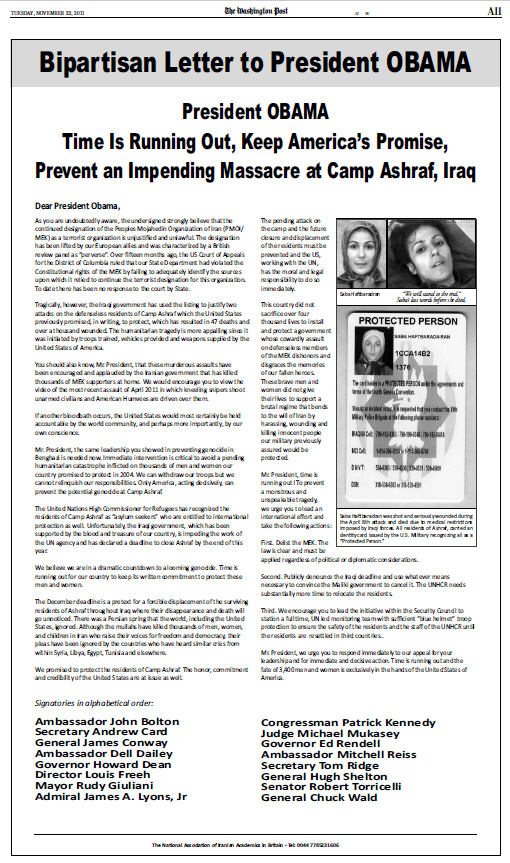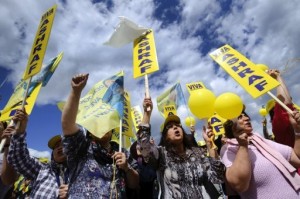Time Is Running Out, Keep America’s Promise, Prevent an Impending Massacre at Camp Ashraf, Iraq.
Dear President Obama,
As you are undoubtedly aware, the undersigned strongly believe that the continued designation of the Peoples Mojahedin Organization of Iran (PMOI/MEK) as a terrorist organization is unjustified and unlawful. The designation has been lifted by our European allies and was characterized by a British review panel as “perverse”. Over fifteen months ago, the US Court of Appeals for the District of Columbia ruled that our State Department had violated the Constitutional rights of the MEK by failing to adequately identify the sources upon which it relied to continue the terrorist designation for this organization. To date there has been no response to the court by State.
Tragically, however, the Iraqi government has used the listing to justify two attacks on the defenseless residents of Camp Ashraf which the United States previously promised, in writing, to protect, which has resulted in 47 deaths and over a thousand wounded. The humanitarian tragedy is more appalling since it was initiated by troops trained, vehicles provided and weapons supplied by the United States of America.
You should also know, Mr. President, that these murderous assaults have been encouraged and applauded by the Iranian government that has killed thousands of MEK supporters at home. We would encourage you to view the video of the most recent assault of April 2011 in which kneeling snipers shoot unarmed civilians and American Humvees are driven over them. If another bloodbath occurs, the United States would most certainly be held accountable by the world community, and perhaps more importantly, by our own conscience.
Mr. President, the same leadership you showed in preventing genocide in Benghazi is needed now. Immediate intervention is critical to avoid a pending humanitarian catastrophe inflicted on thousands of men and women our country promised to protect in 2004. We can withdraw our troops but we cannot relinquish our responsibilities. Only America, acting decisively, can prevent the potential genocide at Camp Ashraf.
The United Nations High Commissioner for Refugees has recognized the residents of Camp Ashraf as “asylum seekers” who are entitled to international protection as well. Unfortunately, the Iraqi government, which has been supported by the blood and treasure of our country, is impeding the work of the UN agency and has declared a deadline to close Ashraf by the end of this year.
We believe we are in a dramatic countdown to a looming genocide. Time is running out for our country to keep its written commitment to protect these men and women.
The December deadline is a pretext for a forcible displacement of the surviving residents of Ashraf throughout Iraq where their disappearance and death will go unnoticed. There was a Persian spring that the world, including the United States, ignored. Although the mullahs have killed thousands of men, women, and children in Iran who raise their voices for freedom and democracy, their pleas have been ignored by the countries who have heard similar cries from within Syria, Libya, Egypt, Tunisia and elsewhere.
We promised to protect the residents of Camp Ashraf. The honor, commitment and credibility of the United States are at issue as well.
The pending attack on the camp and the future closure and displacement of the residents must be prevented and the US, working with the UN, has the moral and legal responsibility to do so immediately.
This country did not sacrifice over four thousand lives to install and protect a government whose cowardly assault on defenseless members of the MEK dishonors and disgraces the memories of our fallen heroes.
These bravemen and women did not give their lives to support a brutal regime that bends to the will of Iran by harassing, wounding and killing innocent people our military previously assured would be protected.
Mr. President, time is running out! To prevent a monstrous and unspeakable tragedy, we urge you to lead an international effort and take the following actions:
First. Delist the MEK. The law is clear and must be applied regardless of political or diplomatic considerations.
Second. Publicly denounce the Iraqi deadline and use whatever means necessary to convince the Maliki government to cancel it. The UNHCR needs substantially more time to relocate the residents.
Third. We encourage you to lead the initiative within the Security Council to station a full time, UN led monitoring team with sufficient “blue helmet” troop protection to ensure the safety of the residents and the staff of the UNHCR until the residents are resettled in third countries.
Mr. President, we urge you to respond immediately to our appeal for your leadership and for immediate and decisive action. Time is running out and the fate of 3,400men and women is exclusively in the hands of the United States of America.
Signatories in alphabetical order:
-
Ambassador John Bolton
-
Secretary Andrew Card
-
General James Conway
-
Ambassador Dell Dailey
-
Governor Howard Dean
-
Director Louis Freeh
-
Mayor Rudy Giuliani
-
Admiral James A. Lyons, Jr
-
Congressman Patrick Kennedy
-
Judge Michael Mukasey
-
Governor Ed Rendell
-
Ambassador Mitchell Reiss
-
Secretary Tom Ridge
-
General Hugh Shelton
-
Senator Robert Torricelli
-
General Chuck Wald

